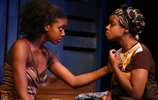
This post originally appeared on the blog for the Arena Stage in Washington, D.C., where the play Ruined is set to open April 22.
Lynn Nottage’s Ruined casts a much-needed spotlight on one of the world’s deadliest wars since World War II. Eastern Congo is home to vast mineral wealth critical to the advancement and functioning of modern technology central to our social engagements, business infrastructure, and commerce. It is also currently one of the most dangerous places in the world to be a woman.
Resulting in a dire humanitarian crisis that remains largely unknown to the U.S. public, armed conflict has ravaged communities for over a decade, claiming nearly six million lives due to killings, displacement, famine, preventable disease, and sexual violence. Here armed groups both foreign and Congolese use sexual violence as a weapon of war to intimidate, disperse, and seize control over mineral-rich territories for their own personal gain. The price paid by civilians is shocking. Attacks are deliberate and well planned, villages are burned, men are killed or taken as forced labor, children captured as child soldiers or orphaned, and women brutally assaulted, stripped of their dignity, family, livelihood, and home.
I first met Mama SJ last October at a camp for internally displaced persons a few kilometers outside Goma, North Kivu. She is easily one of the most beautiful women I had ever encountered. She had been in the camp for over year and told me about the night that she was asleep next to her husband and armed men forced their way into her home. She cried for them to stop as they bound her husband and took him outside. She has no idea how long the brutality lasted, but she was subjected to it by multiple armed men repeatedly.
Mama SJ hasn’t seen her husband since that night; she has no idea if he is dead or alive. She described how she tried to flee on foot with her eight children after the attack, only to be caught by members of an armed group and brutalized again. She finally made it to one IDP camp, but that camp was soon attacked and she fled to another, finally ending up here in Rutshuru. As a result of the attacks and no urgent care services, her broken backbone prevents her from being able to participate in any kind of agricultural livelihood as she once had. She was diagnosed HIV positive and is considered to be a “highly vulnerable” person by medical group Médecins Sans Frontières and by UNHCR. A few of her children are attending school thanks to an unnamed benefactor who hosts them in Goma. She whispered to me and asked, “What kind of mother relies on the kindness of a stranger to educate her daughters and allows them to be raised outside of her watchful eye?” I replied a very brave, very smart, and very strong one.
Mama SJ is one of countless women who have suffered violations that leave even those with the most hardy of constitution feeling weak, and yet she showed few signs of victimhood when we spoke – only the signs of a woman fiercely struggling to survive in an environment where her government offered her no protection, where foreign humanitarian aid did little to improve her conditions, and where the root causes of the conflict continued to rage on unaddressed making her return home impossible.
What would peace mean to Mama SJ? It would be a peace that eliminates the world market for conflict minerals sold by war criminals. A peace that ensures war criminals no longer thrive within the ranks of Congo’s armed forces but are instead submitted to swift punishment under the law. A peace that permanently reduces the threats posed to civilians by armed militias lingering in Congo’s bush. A peace that comes about through the participation of women at the decision-making table to ensure this peace truly returns peace back to them.
As Mama M, a brave and insightful human rights defender working with HEAL Africa’s community mediation and reconciliation programs, said, “Western consumers actually have the ability to stop the financing of war in my country.” She showed me her mobile phone and told me:
Congo’s minerals are not bad for us – the system that allows war criminals to exploit them for their own benefit regardless of the human costs is what is bad for us. The use of sexual violence to destroy communities and families beyond the hope of repair is what is bad for us, the fact that thousands and thousands of women have been subjected to the most cruel forms of rape and torture as a tactic of armed groups is what is bad for us. The fact that these women are then stigmatized from their own communities, left as widows or caste out to die of a disease we have no cure for [HIV] as a result of these rapes is what is bad for us.
Indeed Mama M is absolutely right – so what can we do about it?
The Enough Project, an organization committed to ending and preventing mass atrocities and genocide, runs a campaign called Raise Hope for Congo. Its purpose is to educate western consumers about the direct role they can play in tackling the causes of war described by Mama M and help make the kind of peace Mama SJ hopes for a reality. Our campaign seeks to educate and mobilize global consumers to take meaningful action that can bring about permanent solutions to the deadly conflict in eastern Congo. For more information about how you can become part of this worldwide movement, visit our website at www.raisehopeforcongo.org.
Photo: Actresses in the Manhattan Theatre Club's production of Ruined (MTC/Joan Marcus)

